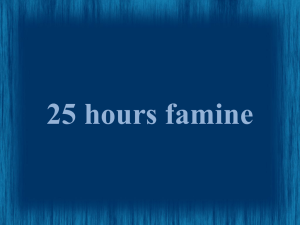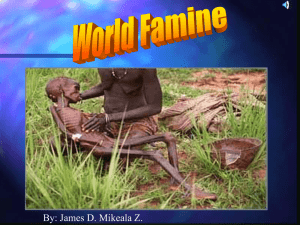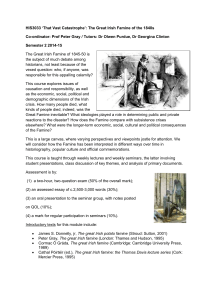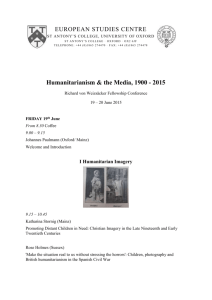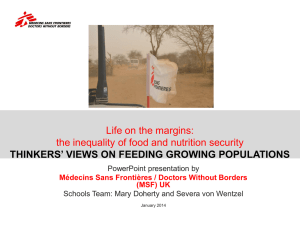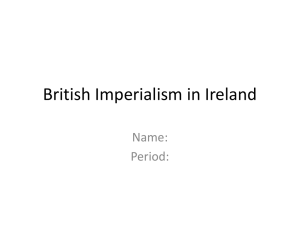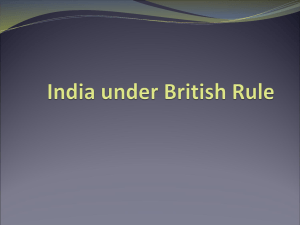Comms & Hum Module Outline JN508 K Somerville 2015
advertisement
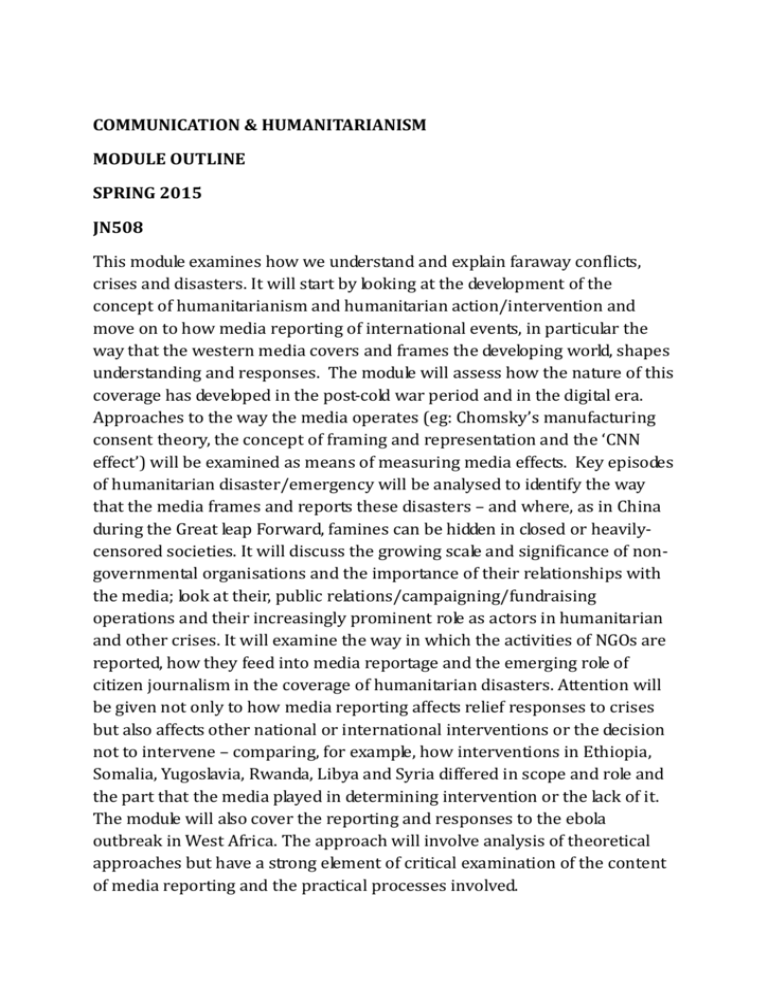
COMMUNICATION & HUMANITARIANISM MODULE OUTLINE SPRING 2015 JN508 This module examines how we understand and explain faraway conflicts, crises and disasters. It will start by looking at the development of the concept of humanitarianism and humanitarian action/intervention and move on to how media reporting of international events, in particular the way that the western media covers and frames the developing world, shapes understanding and responses. The module will assess how the nature of this coverage has developed in the post-cold war period and in the digital era. Approaches to the way the media operates (eg: Chomsky’s manufacturing consent theory, the concept of framing and representation and the ‘CNN effect’) will be examined as means of measuring media effects. Key episodes of humanitarian disaster/emergency will be analysed to identify the way that the media frames and reports these disasters – and where, as in China during the Great leap Forward, famines can be hidden in closed or heavilycensored societies. It will discuss the growing scale and significance of nongovernmental organisations and the importance of their relationships with the media; look at their, public relations/campaigning/fundraising operations and their increasingly prominent role as actors in humanitarian and other crises. It will examine the way in which the activities of NGOs are reported, how they feed into media reportage and the emerging role of citizen journalism in the coverage of humanitarian disasters. Attention will be given not only to how media reporting affects relief responses to crises but also affects other national or international interventions or the decision not to intervene – comparing, for example, how interventions in Ethiopia, Somalia, Yugoslavia, Rwanda, Libya and Syria differed in scope and role and the part that the media played in determining intervention or the lack of it. The module will also cover the reporting and responses to the ebola outbreak in West Africa. The approach will involve analysis of theoretical approaches but have a strong element of critical examination of the content of media reporting and the practical processes involved. Module delivery: Spring Term 2014-2015 Lecture: Mondays 15.00-17.00 (please refer to your personal timetable for location) Please come prepared by studying the suggested readings and by attending the lecture. You will be expected to contribute actively to discussion during the seminars, so be ready to be put on the spot. Keith Somerville K.Somerville@kent.ac.uk Learning Outcomes The learning outcomes of this module are as follows: On successful completion of this module students will: ● Be familiar with the influence of broadcast media in the political sphere and on the voluntary sector. ● Critically assess the impact of the internet on media power and media consumption. ● Acquire knowledge of the central role that communications and media play at national, international and global levels of economic, political and social organisations along with the ability to articulate and explore the implications of this. ● Gain awareness of the diversity of approaches to understanding communication and media in historical and contemporary contexts. Assessment The module will be assessed through a two hour exam (50%) in term 3 and by an essay of maximum 3,000 words (30%) and an oral presentation (20%) in a seminar in term 2. The assessments will be an opportunity for you to demonstrate and us to assess your ability to: communicate in writing and verbally; to identify and define problems and key issues; analyse and combine information to present arguments that clearly demonstrate understanding of the issues and acquired knowledge; carry out research online; and meet deadlines. General Introduction The following books and articles give a useful overview of the subject – and some of them will also relate to particular weekly topics below. Absolutely essential – Suzanne Franks, Reporting Disasters: Famine, Aid, Politics and the Media, London: Hurst and Co, 2013. De Waal, Alexander.Famine Crimes. Indiana University Press, Bloomington, 1997. Excellent tour de force on famine in the modern world. Franks, Suzanne. “Lacking a Clear Narrative: Foreign Reporting after the Cold War”.The Political Quarterly, Vol. 76, Suppl.1 (2005): 91-101 Moeller, Susan D. Compassion Fatigue.New York : Routledge, 1999. (Very good on US media and attitudes/reporting of crises but some skating over facts and a willingness to accept types of superficial coverage rather than question or criticize) Keen, David. Complex Emergencies. Cambridge: Polity , 2007. Key text on the nature of emergencies; how and why they occur in the ways they do. Polman, Linda. War Games.The story of aid and war in modern times. London : Viking, 2010 Reiff, David.A Bed for the Night: Humanitarianism in Crisis. London : Vintage, 2002. Richardson, John E Analyzing Newspapers London: Palgrave 2007 Sen Amartya, Poverty and Famines: An Essay on Entitlement and Deprivation. Oxford: Oxford University Press, 1981. Sen, Amartya. Development as Freedom. Oxford: Oxford University Press, 1999. V good – key text on famine, democracy and the media. Vaux , Tony. The Selfish Altruist: Relief Work in Famine and War. London: The following websites are also of use www.alertnet.org Reuters humanitarian network website www.dec.org.uk Disasters Emergency Committee www.frontlineclub.co.uk Independent Journalism Club, London www.bbc.co.uk/worldservice/trust BBC World Trust Service http://www.ibt.org.uk/ International Broadcasting Trust http@//www.africajournalismtheworld.com Africa – News and Analysis It is also worth looking at the individual NGO websites (Oxfam, Save the Children, Medicins sans Frontiers, the Red Cross and at the Dfid and the BBC World Service Trust sites) Topics – as we have a guest speaker on ebola in week 2, we will cover topics 1 and 2 in week 1, making the two hours a combined double lecture/seminar Topic 1: What is humanitarianism? Why do we start care about faraway victims of famine, conflict or natural disasters and how do we respond? Allen, Tim and Seaton, Jean. “Introduction”, in Tim Allen and Jean Seaton (eds), The Media of Conflict: War Reporting and Representations of Ethnic Violence, London: Zed Books, 1990, pp. 1-7. Keen, David. “ ‘Who’s it Between?’ ‘Ethnic War’ and ‘Rational Violence’, in Allen, Tim and Seaton, Jean.1990. “Introduction”, in Tim Allen and Jean Seaton (eds), The Media of Conflict: War Reporting and Representations of Ethnic Violence, London: Zed Books,1990. Keen, David. Complex Emergencies. Cambridge: Polity , 2007. Pp1-24. Vaux , Tony. The Selfish Altruist: Relief Work in Famine and War. London: Sterling, VA : Earthscan, 2001. Topic 2: Reporting the world and understanding the “other”. Framing and representation as prisms through which the media projects world events. Franks, Suzanne. “Lacking a Clear Narrative: Foreign Reporting after the Cold War”.The Political Quarterly, Vol. 76, Suppl.1 (2005): 91-101 Harding, Philip. “The Great Global Switch-Off International Coverage in UK Public Service Broadcasting”, Oxfam.org.uk 2009 [PDF], www.oxfam.org.uk/resources/.../great_global_switch_off.pdf Herman and Chomsky, Manufacturing Consent, chapter 1 (it's uploaded to the module page on Moodle) Media Standards Trust Publications.“Shrinking World: The decline of international reporting in the British press”.Media Standards Trust. 11 November, 2010. [PDF], http://mediastandardstrust.org/publications/shrinking-world-the-decline-of-international-reporting-in-thebritish-press/ Steven Livingston, CLARIFYING THE CNN EFFECT:An Examination of Media Effects According to Type of Military Intervention, http://www.genocidewatch.org/images/1997ClarifyingtheCNNEffect-Livingston.pdf Steven Livingston, The CNN Effect reconsidered: mapping a research agenda for the future Media, War & Conflict April 2011 4: 3-11 Robinson, Piers. CNN Effect: The myth of news, foreign policy and intervention. London: Routledge, 2002 Pawson, Lara. “Reporting African Wars”. In Communicating war: memory, media and military, edited by Sarah Maltby and Richard Keeble, 42-55. Arima Publishing 2009. Somerville, Keith. British media coverage of the post-election violence in Kenya, 2007-8, Journal of Eastern African Studies, vol 3, no 3, 2010 pp. 52642. Somerville, Keith. Africa is Tribal, Europe is Ethnic: The Power of Words in the Media, Committee of Concerned Journalists, New York. http://www.concernedjournalists.org/africa-tribal-europe-ethnic-powerwords Cottle, Simon.Global Crisis Reporting. Berkshire: Open University Press, 2009. Topic 3: Reporting Conflicts, Emergencies and Disasters : Vietnam, the first TV war, and why the Tsunami was more important than the DRC. Fair – Fairness and Accuracy in Reporting. World’s Worst Disasters Overlooked: Survey identifies biggest “forgotten” crises. http://www.fair.org/index.php?page=2537 Franks, Suzanne. ‘The Neglect of Africa and the Power of Aid’. International Communication Gazette, Vol.72 n.1 (2010): 71-84 Hallin, Daniel. Presentation given at the “American Media and Wartime Challenges” Conference – media and Vietnam. (March 21-March 22, 2003, Chapel Hill, North Carolina. Uploaded to Moodle. International Red Cross. “World disasters report : focus on information in disasters”. Accessed November 21, 2010.http://www.ifrc.org/publicat/wdr2009/summaries.asp International Rescue Committee – Congo, the forgotten crisis http://www.rescue.org/special-reports/congo-forgotten-crisis Rhodes, Henry A. The News Media’s Coverage of the Vietnam War, http://www.yale.edu/ynhti/curriculum/units/1983/4/83.04.03.x.html Vaux , Tony. The Selfish Altruist: Relief Work in Famine and War. London; Sterling, VA : Earthscan, 2001. Humanitarian Exchange20 (2002) Topic 4: Famine and Censorship - the Great Leap Forward famine in China and other hidden famines. Becker,Jasper. Hungry Ghosts. Mao’s Secret Famine, Free Press, 1996 De Waal, Alexander. Famine Crimes. Indiana University Press, Bloomington, 1997. Dikkoter, Frank. Mao’s Great Famine: the History of China's Most Devastating Catastrophe, 1958-1962. London: Bloomsbury Publishing Plc, 2010. ReliefWeb.“Starving in Silence: A Report on Famine and Censorship”. Accessed on 21 November, 2010. http://www.reliefweb.int/rw/lib.nsf/db900SID/OCHA-6NMTSW? Sen, Amartya. Development as Freedom. Oxford: Oxford University Press, 1999. Sen, Amartya, Individual Freedom as a Social Commitment, New York Review of Books, on Moodle. Myhrvold-Hanssen, Thomas, A Critique of Amartya Sen’s Argument on Famine and democracy Deveraux, Stephen, Sen’s Entitlement Approach: Critiques and Counter-critiques, Oxford Development Studies, Vol. 29, No. 3, 2001 New York Times 1 March 2003 – Critics of Sen www.disasterdiplomacy.org/MyhrvoldHanssenBiharFamine.rtf Sen and famin e-democracy - powerpoint on Moodle with crux of his argument and those of critics. English accounts of ‘Tombstone’ book by Yang Jisheng on Chinese Famine for example http://www.telegraph.co.uk/comment/personal-view/3561510/A- tombstone-on-Chinas-history.html Topic 5 The Greatest Show on Earth – Reporting Ethiopia and the Aftermath. The birth of celebrity coverage. Suzanne Franks, Reporting Disasters: Famine, Aid, Politics and the Media, London: Hurst and Co, 2013. Allen, Robert. “Bob’s Not Your Uncle”. Capital and Class Vol. 30 (1986) BBC/Martin Plaut, On the trail of Ethiopia aid and guns. http://news.bbc.co.uk/1/hi/programmes/from_our_own_correspondent/8 548412.stm Franks, Suzanne.Why Bob Geldof has got it wrong. British Journalism Review, Volume 21, Number 2, 2010. Gill, Peter. Famine and Foreigners: Ethiopia since Live Aid. Oxford University Press, 2010 Philo, Greg “From Buerk to Band Aid”. In Getting the Message edited by John Eldridge, 104-125. Glasgow University Media Group: Routledge, 1993. Rieff, David. Cruel to be Kind http://www.guardian.co.uk/world/2005/jun/24/g8.debtrelief Voluntary Service Overseas. “The Live Aid Legacy.The developing world through British eyes – A research report”. In Dochas.ie. Accessed on 21 November, 2010.www.dochas.ie/Shared/Files/7/The_Live_Aid_Legacy.pdf Topic 6 Hour of Shame. The Rwandan Genocide and the Failure to Report. When the media in a crisis zone becomes part of the problem – broadcasting propaganda and hatred. Somerville, Keith, Radio Propaganda and the Broadcasting of Hatred, Basingstoke: Palgrave, 2012, Rwanda Chapter. Dallaire, Romeo.Shake Hands with the Devil. The Failure of Humanity in Rwanda.New York: Carroll & Graf Publishers, 2004. Des Forges, Alison. Leave None to tell the Story: Genocide in Rwanda, New York: Human Rights Watch, 1999. Gourevitch, Philip. We wish to inform you tomorrow we will be killed with our families. Picador, 1999 Kellow, Christine L., and Steeves, Leslie H. The Role of Radio in the Rwandan Genocide. Journal of Communications, 48, 3, 1998, pp.109-128. Melvern, Linda. “The press failed to hold politicians to account over Rwanda”. Guardian, July 16, 2010. http://www.guardian.co.uk/commentisfree/2010/jul/16/rwandagenocide-media-un-policy Moeller, Susan D. Compassion Fatigue.New York : Routledge, 1999. Chapter Five. Thompson, Allan. The Media and the Rwanda Genocide.London: Pluto Press, 2007 DVDs: Feature films George, Terry. Hotel Rwanda. Lions Gate Films, 2004 Caton-Jones, Micheal. Shooting Dogs.CrossDay Production Ltd., 2005 Topic 7 The Rise and Rise of the NGO Are they modern-day saints and should we believe all that they say? Black, Maggie. A Cause For Our Time: Oxfam the first 50 years.Oxford : Oxfam, 1992. Cooper, Glenda. “When Lines between NGOs and News Organisations Blur”.Nieman Journalism Lab, December 21, 2009. Accessed on November 22, 2010. http://www.niemanlab.org/2009/12/glenda-cooper-when-lines-betweenngo-and-news-organization-blur/ Cottle, Simon. Global Crisis Reporting. Berkshire: Open University Press, 2009. Chapter 8 Glennie, Jonathan. “We need greater transparency over aid budgets”. Poverty Matters Blog, October 28, 2010. Accessed on November 22, 2010. Roning, Helge. “Unholy Alliance”.Rhodes Journalism Review, December (1999): 42. [PDF]. Accessed on November 22, 2010. http://www.rjr.ru.ac.za/rjrpdf/rjr_no18/unholy_alliance.pdf Shamima, Ahmed and David Potter.NGOs in International Politics. Kumarian Press, 2006. Vaux , Tony. The Selfish Altruist: Relief Work in Famine and War. London; Sterling, VA : Earthscan, 2001. Humanitarian Exchange20 (2002) Warah, Rasna. Somalia’s Unholy Alliance: Media, Donors and Aid Agencies http://www.pambazuka.org/en/issue/545 http://www.guardian.co.uk/global-development/povertymatters/2010/oct/28/aid-budgets-transparency Topic 8 New Media, Citizen Journalism and the coverage of humanitarian issues. Monica Anderson and Andrea Caumont, How social media is reshaping news, http://www.pewresearch.org/fact-tank/2014/09/24/how-socialmedia-is-reshaping-news/ BBC College of Journalism – video discussion of new Media and the Arab Spring - http://www.bbc.co.uk/journalism/blog/2011/11/big-stories-thearab-spring.shtml Ben-Meir, Alon. The Arab Spring: A New Era in a Transforming Globe. http://www.huffingtonpost.com/alon-benmeir/the-arab-spring-a-newera_b_1082577.html?ref=world Cooper, Glenda. “Anyone here survived a wave, speaks English and got a mobile?”, Guardian Lecture presented at Nuffield College, Oxford,2007. [PDF].http://www.nuffield.ox.ac.uk/Guardian/Nuffield%20Guardian%20Le cture%202007.pdf Cooper, Glenda. From their own correspondent? New media and the changes in disaster coverage: lessons to be learnt. Reuters Institute for the Study of Journalism. http://reutersinstitute.politics.ox.ac.uk/fileadmin/documents/Publications/ Working_Papers/From_Their_Own_Correspondent.pdf Economist. How Luther Went Viral http://www.economist.com/node/21541719 A very good look at how media has always been "new" and used by both sides in conflicts. Hilsum, Lindsey. Sandstorm: Libya in the Time of Revolution. London: faber and faber, 2012. Morozov, Evgeny. The Net Delusion: How Not to Liberate the World. London: Allen Lane, 2011. Twitter, Facebook and You Tube's Role in Arab Spring http://socialcapital.wordpress.com/2011/01/26/twitter-facebook-andyoutubes-role-in-tunisia-uprising/ An exhaustive survey of the role of social/new media in the Arab Spring. Can intervention in Syria be legally justified? http://www.dw.de/canintervention-in-syria-be-legally-justified/a-17054717 Heather Roff, A (Sort of) Red Line: Obama's Syrian Dilemma, http://www.huffingtonpost.com/heather-roff/a-sort-of-red- line_b_3805075.html Topic 9 Images of Suffering and Conflict – how images as well as words affect our knowledge and responses BBC – How media differ in use of images in gaza reporting: http://www.bbc.co.uk/news/world-middle-east-28680590 Jeremy Bowen – we live in more violent times. http://www.independent.co.uk/news/media/tv-radio/jeremy-bowen-welive-in-more-violent-times-no-question-about-it-9179966.html Boltanski, Luc. Distant Suffering.Cambridge: Cambridge University Press, 1999. Chouliaraki, Lilie. The spectatorship of suffering. London: SAGE, 2006. Chapter 7 in: Cottle, Simon. Global Crisis Reporting.Berkshire: Open University Press, 2009. Marinovich, Greg .The Bang Bang Club.London: Arrow Books, 2001 Moeller, Susan D.Compassion Fatigue. New York and London: Routledge, 1999. Chapter 1. The following websites are also of use: www.imaging-famine.org Imaging Famine www.david-campbell.org. David Campbell Blog Topic 10 Narratives of Humanitarianism and the impact on policy: Somalia, ebola in West Africa, Gaza and the Syria-Iraq conflict: why states intervene and the role of the media. The CNN effect revisited. Barnett, Michael, and Thomas Weiss.Humanitarianism in Question: Politics, Power, Ethics. Ithaca, N.Y.; Cornell University Press, 2008. Al-Daini, Adnan.Western Military Intervention in Libya - How Will It End? http://www.huffingtonpost.co.uk/adnan-aldaini/western-militaryinterven_b_938286.html Chris Gunness of UNRWA on Gaza crisis https://www.youtube.com/watch?v=PyJfd4EjiXg Harmon, Matthew T. The Media, Technology and United States Foreign Policy: A Re-examination of the “ CNN effect”, Swords and Ploughshares: A Journal of International Affairs online, VolIII • No. 2 • Spring 1999. Angelique Kidjo, ebola and dehumanization of Africa. http://www.nytimes.com/2014/10/31/opinion/dont-let-ebola-dehumanizeafrica.html?_r=0 Nasaw, David. US military action in Somalia: Black Hawk Down to today's attack.http://www.guardian.co.uk/world/2009/sep/14/black-hawk-downus-somalia Robinson, Piers. CNN Effect: The myth of news, foreign policy and intervention. London: Routledge, 2002 Rick Rowden – ebola and the iMF. http://www.foreignpolicy.com/articles/2014/10/30/west_africas_financial _immune_deficiency_ebola_imf Shaw, Martin.Civil Society and Media in Global Crises: Representing Distant Violence. London: Pinter, 1996. Topic 11: Revision lecture and seminar ESSAY – ESSAY – Submit one hard copy in a plastic folder via Student Admin and one on Moodle. Deadline is 1300 on 9th March 2015. Choose one of the following: • The Vietnam War has been described as the first TV war. After the American pull-out politicians and senior military leaders accused the media of “losing the war” for America. Why was the media so important in this conflict and what effect did it really have? • What are hidden famines and why do they occur? Examine the Chinese famine of the Great leap Forward period, analysing why the media failed to report it. • The “CNN effect” is a concept used to ascribe great power to the media over public opinion and government policy in humanitarian crises. It emerged with the development and potential for blanket coverage of stories of 24 Hour news. Analyse the concept and its application using examples from at least two of the case studies of media coverage of humanitarian crises from the module • Examine the reporting of the ebola crisis in West Africa, giving particular attention to the reasons presented in the media for spread of the disease and the seeming failure of health systems in Sierra Leone, Guinea and Liberia, and examining the contention that reporting both dehumanized those affected and wrongly represented the incidence of the disease in Africa. 0RAL PRESENTATIONS These should be of 8-10 minutes in duration and cover a topic of your choice from within the module. They should be accompanied by a powerpoint or some other form of visual display that illustrates and supports the presentation. They will be scheduled in the second half of the term and will be delivered during seminars. A timetable will be established for delivery.
